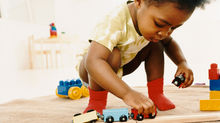8 Ways to Globalize Your Child
- Dr. BOD
- Feb 29, 2016
- 4 min read

Globalization is making the world in which we live a much smaller place. Cuisine, music, fashion, spiritual beliefs, cultural taboos, and languages once unfamiliar are now quickly accessed through mobile apps, social media, commercial travel, fast food takeout, attending school, talking with coworkers, visiting family, or hanging out with friends. Although this global phenomenon enhances the speed in which we exchange information, it can also have a devastating impact on the economy (job outsourcing), public health (disease transmittance), and security (from identity theft to terrorism). Growing up in a rapidly changing world can have its benefits and drawbacks. Here are 8 ways you can prepare your child to become a "responsible, successful and culturally aware" global citizen.
1. SEE THE WORLD
Traveling with your child domestically and internationally is a great way to expose them to different cultures. If travel is financially infeasible, the United States Bureau of Education and Cultural Affairs, as well as numerous private scholarships, offer students the opportunity to travel abroad. There's also a subscription-based service called Little Passports, which exposes children to the geographies and cultures of different states and countries every month.
2. VISIT A MUSEUM
There are a plethora of museums throughout the United States and the world. Most metropolitan areas and major universities have a natural history, cultural, historical, or art museum. All types of museums should be visited to expose children to ecology, human prehistory, artifacts from ancient civilizations, and the modern material culture and artistry from across the globe.

Photo Credit: metmuseum.org
3. ATTEND CULTURAL EVENTS
Local heritage festivals, live performances, parades, and theatrical productions among other events are a fantastic way to introduce your little one to the diverse cultures that comprise our nation. Throughout the year, various ethnic groups celebrate their cultural heritage, and you can find several events to attend for free. Try contacting your city or county's cultural services or affairs department to learn more.

4. TRY NEW CUISINE
Food is a gateway to learning about another culture. Thai, Indian, Caribbean, Soul Food, Southern, Mexican, Colombian, Ethiopian, Chinese, Italian, Moroccan, and Greek restaurants among others are found across the nation. Try making it a family tradition to visit several cultural restaurants throughout the year. If you're not sure where to look, Yelp is an amazing online resource to learn about the local restaurants in your area.

5. REAL TALK
Looking back on my childhood, I see the value in open dialogue with my parents. It was in elementary school that I first learned my clothes were not name brand, my dark skin and curly hair texture differed from many of my classmates, and that teachers expected us girls to play with dolls and boys to play with building blocks and toy machinery. It's unrealistic to raise your child to not to see difference across race, class, and gender. Part of becoming a global citizen is not only embracing diverse cultures, but being aware of the disparities between them. As children interact with friends, classmates, and adults of different backgrounds, they will have questions. Do your child a favor. When they come to you with questions (and they will) be ready to have the talk.

6. LEARN A LANGUAGE
My husband is perhaps the humblest person I know, but for the sake of this point, I must use my spousal liberties to brag on him...just a little. He's fluent in four languages, and when I wanted to learn another language, he highly recommended a free language app called Duolingo. If you need greater immersion, Rosetta Stone is another effective language software. Learning a computer programming language like JAVA, SQL, Python, RUBY, C#, PHP, C++, JavaScript, HTML5 and iOS/SWIFT are equally important. Coursera, Lynda, Udemy, and Codeacademy are just some of the many places you can learn. Check out my earlier blog post to learn how STEM toy companies are teaching children how to code. Knowing human and computer languages are highly sought after skills by employers, and will prepare your child to enter a competitive job market.

7. SAFETY FIRST
When I see little children tinkering with a cell phone or iPad, I am both intrigued and concerned. This new generation is mastering technology at a young age, and technological fluency will be essential to their future success. However, children can fall prey to online predators, cyberbullying, and pornography. As parents, unapologetically monitor your child's online activity. Wanting to be your child's BFF should never override your parental responsibility. "My child deserves their privacy," is a mindset that can potentially place your child in harm's way. Do not feel bad about using those parental controls on home devices, and checking your child's browsing history regularly.

8. FAMILY GENEALOGY
I think one of the best ways to appreciate the culture of another is to first embrace the culture(s) that make up who you are. Self-love is a powerful state of being that builds confidence, integrity, tough skin, and tolerance. Researching your family tree is one way to learn more about who you are, and the ancestors you may not have known you had. Speaking to the elders in your family, organizing family reunions, and using online databases like Ancestry.com, are three ways to identify the branches in your tree.



























Comments